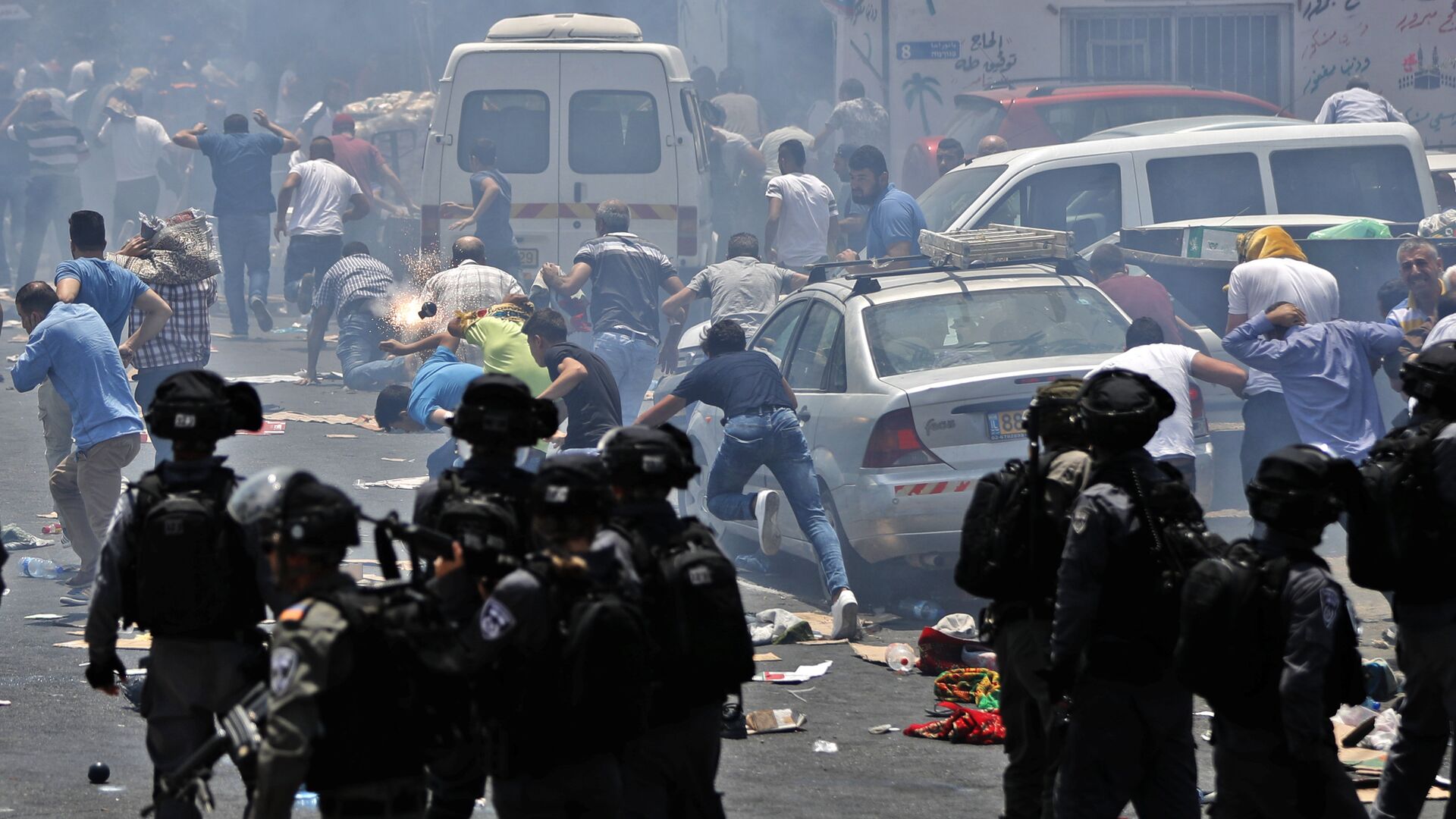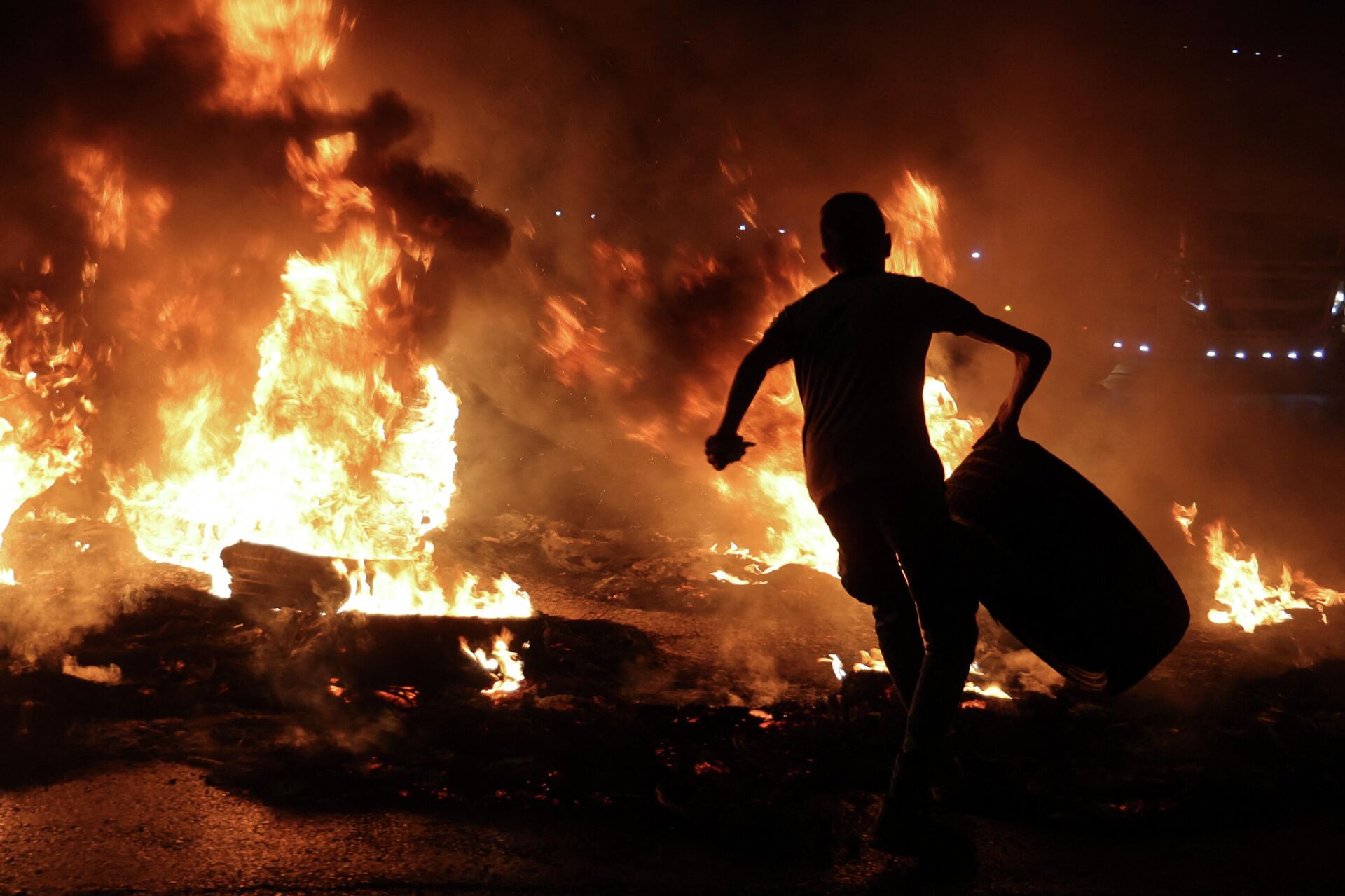https://sputnikglobe.com/20220623/israeli-elections-will-change-nothing-for-palestinians-as-politicians-all-the-same-says-pundit-1096585746.html
Israeli Elections Will Change Nothing for Palestinians as Politicians 'All the Same', Says Pundit
Israeli Elections Will Change Nothing for Palestinians as Politicians 'All the Same', Says Pundit
Sputnik International
Israel is set to take to the polls on November 1 and former Prime Minister Benjamin Netanyahu seems to appear the frontrunner in that race. f he makes a... 23.06.2022, Sputnik International
2022-06-23T12:19+0000
2022-06-23T12:19+0000
2023-01-15T17:26+0000
middle east
palestinian territories
palestinians
israel
https://cdn1.img.sputnikglobe.com/img/105575/36/1055753624_0:157:3169:1939_1920x0_80_0_0_754b670695145c5c4bb142b9c7309584.jpg
On Wednesday, the Israeli parliament convened to vote on a preliminary bill that would disperse the 24th Knesset, triggering another round of national polls, the fifth in three years.Nothing SurprisingThose recent developments in Israel didn't surprise Mkhaimar Abusada, a political analyst based in neighboring Gaza.Naftali Bennett's tenure was relatively quiet, compared to those of Palestinian leaders. During his year in office, Israel and the armed factions of the Gaza Strip have not gone to war. The Jewish state removed some of the restrictions imposed on the enclave, including the expansion of the fishing zone. The quota for the Palestinian workers from the West Bank has gone up, reaching 120,000 as opposed to the previous 100,000. The people of Gaza have also received a boost in work permits with recent reports suggesting 14,000 will be admitted in.But Abusada says that despite these achievements, the Bennett government will not be missed.Netanyahu Is Back on Track?The alternative might be the return to power of former Prime Minister Benjamin Netanyahu. Recent polls predict that the former Prime Minister Benjamin Netanyahu will be leading the race set for November 1.He is projected to get 36 seats in the Knesset that contains 120 spots, remaining Israel's biggest and most powerful party.Although he is still one to two seats short of making a come-back, there are chances that he will manage to forge a coalition, and that might spell more trouble for the Palestinians, suggests the analyst.During his 12 years in the PM's seat, Netanyahu has greenlighted more than 12,000 residential units in the West Bank that aimed to serve the demands of the area's constantly growing population of settlers.In the Gaza Strip, he fought three major wars with the militants of Hamas and the Palestinian Islamic Jihad, operations that destroyed the enclave's infrastructure and reportedly claimed the lives of more than 2,000 Palestinians. Israeli casualties in these conflicts only added up to several dozen.The most recent one -- the Guardian of the Walls -- occurred last May. During the 11 days of fighting, Israel reportedly blew up multiple schools, mosques, roads, police stations and residential buildings, claiming these were used by the militants of the Palestinian armed forces. More than 250 people have lost their lives amid these hostilities.However, Abusada says the Palestinians are not worried about a potential come-back of Netanyahu.Even the more liberal Yair Lapid, the head of Yesh Atid, Israel's second biggest party, does not get the approval of the Palestinians, says Abusada.Although his political agenda embraces the two-state solution and advocates for equality, chances that he would be able to adhere to his principles, says the Gaza-based analyst, are scarce. And the reason for this is Israel's political system.Previous liberal governments did manage to leave their mark and move things forward, despite having conservative elements in their coalition. Such was the case with Yitzhak Rabin's second term, known for its peace accords with Jordan and an agreement with the Palestinians. Such was also the case with Ehud Barak, who is remembered for his withdrawal from Lebanon in 2000. But for Abusada a repeat of past successes seems like an improbable scenario."We realize that nothing will change. But if the more liberal forces come to power, we might at least see some economic concessions. More work permits for the Palestinians. More economic changes and the end of the 15-year-old blockade of the Gaza Strip."
israel
Sputnik International
feedback@sputniknews.com
+74956456601
MIA „Rossiya Segodnya“
2022
News
en_EN
Sputnik International
feedback@sputniknews.com
+74956456601
MIA „Rossiya Segodnya“
Sputnik International
feedback@sputniknews.com
+74956456601
MIA „Rossiya Segodnya“
middle east, palestinian territories, palestinians, israel
middle east, palestinian territories, palestinians, israel
Israeli Elections Will Change Nothing for Palestinians as Politicians 'All the Same', Says Pundit
12:19 GMT 23.06.2022 (Updated: 17:26 GMT 15.01.2023) Israel is set to take to the polls on November 1 and former Prime Minister Benjamin Netanyahu seems to appear the frontrunner in that race. f he makes a come-back, Palestinians might see their lives take a turn for the worse, believes Mkhmair Abusada, but he adds Gazans are not worried.
On Wednesday, the Israeli parliament convened to vote on a preliminary bill that would disperse the 24th Knesset, triggering another round of national polls, the fifth in three years.
Those recent developments in Israel didn't surprise Mkhaimar Abusada, a political analyst based in neighboring Gaza.
"From the very beginning we knew that this government was fragile, with only 61 [out of 120] seats. We thought that the coalition would stick around until the end of the year or even until the arrival of US President Joe Biden. But it collapsed quite suddenly on Monday."
Naftali Bennett's tenure was relatively quiet, compared to those of Palestinian leaders. During his year in office, Israel and the armed factions of the Gaza Strip have not gone to war. The Jewish state removed some of the restrictions imposed on the enclave, including the expansion of the fishing zone. The
quota for the Palestinian workers from the West Bank has gone up, reaching 120,000 as opposed to the previous 100,000. The people of Gaza have also received a boost in work permits with recent reports suggesting 14,000 will be admitted in.
But Abusada says that despite these achievements, the Bennett government will not be missed.
"During this past year, there was no progress in the peace process," he said over the phone. "Prime Minister Bennett made it clear that he didn't want to meet with the Palestinian leader Mahmoud Abbas. Settlement expansion has continued and so did arrests and house demolitions."
Netanyahu Is Back on Track?
The alternative might be the return to power of former Prime Minister Benjamin Netanyahu. Recent polls predict that the former Prime Minister Benjamin Netanyahu will be leading the race set for November 1.
He is projected to get 36 seats in the Knesset that contains 120 spots, remaining Israel's biggest and most powerful party.
Although he is still one to two seats short of making a come-back, there are chances that he will manage to forge a coalition, and that might spell more trouble for the Palestinians, suggests the analyst.
During his 12 years in the PM's seat,
Netanyahu has greenlighted more than 12,000 residential units in the West Bank that aimed to serve the demands of the area's constantly growing population of settlers.
In the Gaza Strip, he fought three major wars with the militants of Hamas and the Palestinian Islamic Jihad, operations that destroyed the enclave's infrastructure and
reportedly claimed the lives of more than 2,000 Palestinians. Israeli
casualties in these conflicts only added up to several dozen.
The most recent one -- the Guardian of the Walls -- occurred last May. During the 11 days of fighting, Israel
reportedly blew up multiple schools, mosques, roads, police stations and residential buildings, claiming these were used by the militants of the Palestinian armed forces. More than 250 people have lost their lives amid these hostilities.
However, Abusada says the Palestinians are not worried about a potential come-back of Netanyahu.
"The potential return of Netanyahu won't make any difference to the Palestinians," said the analyst. "All Israeli politicians are the same. All of them are against the Palestinian right of return. None of them would accept to split Jerusalem and none will want to go back to pre-1967 borders".
Even the more liberal Yair Lapid, the head of
Yesh Atid, Israel's second biggest party, does not get the approval of the Palestinians, says Abusada.
Although his political agenda embraces the two-state solution and advocates for equality, chances that he would be able to adhere to his principles, says the Gaza-based analyst, are scarce. And the reason for this is Israel's political system.
"At the end of the day, even if Lapid gets elected he will need to sit down with Israel's right-wing parties, like he did now with Bennett, Saar and Gantz. He will also need to sign a coalition agreement and that means that even if he will want to move towards a two-state solution, he won't be able to do that because of his coalition partners."
Previous liberal governments did manage to leave their mark and move things forward, despite having conservative elements in their coalition. Such was the case with Yitzhak Rabin's second term, known for its peace accords with Jordan and an agreement with the Palestinians. Such was also the case with Ehud Barak, who is remembered for his withdrawal from Lebanon in 2000. But for Abusada a repeat of past successes seems like an improbable scenario.
"Much water has gone under the bridge since then," Abusada said, referring to the multiple wars, restrictions and the siege of Gaza.
"We realize that nothing will change. But if the more liberal forces come to power, we might at least see some economic concessions. More work permits for the Palestinians. More economic changes and the end of the 15-year-old blockade of the Gaza Strip."



